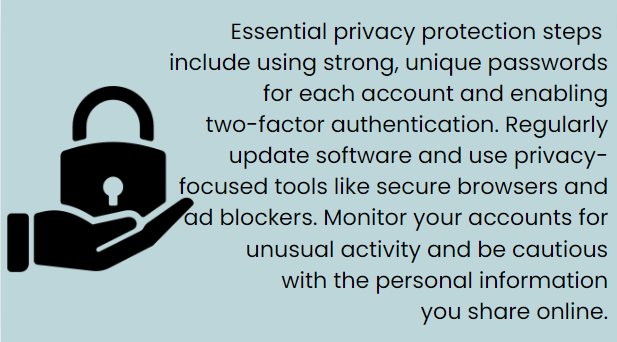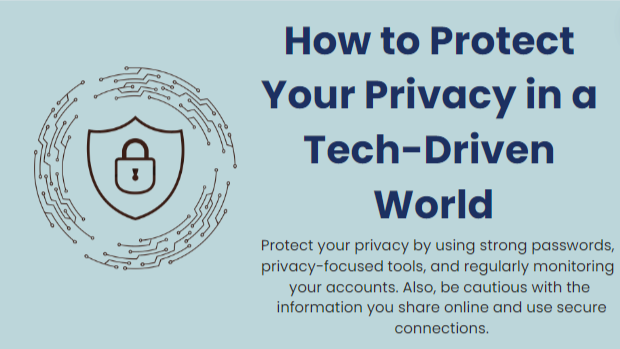In our increasingly connected world, protecting your privacy has become more crucial than ever. With technology integrated into almost every aspect of our lives, it’s essential to understand the risks and take proactive steps to safeguard your personal information. This guide will explore various strategies and tools to help you maintain your privacy in the digital age.
Why Privacy Matters
Privacy is fundamental to personal security, financial protection, and maintaining control over your digital footprint. In an era where data is often referred to as the new currency, safeguarding your personal information is akin to protecting your assets.
Key reasons why privacy matters:
- Personal security and safety
- Financial protection against fraud
- Control over personal information
- Freedom of expression without fear of judgment
- Protection against discrimination
- Maintaining professional and personal boundaries
Understanding the importance of privacy is the first step towards taking action to protect it. When you recognize the value of your personal information, you’re more likely to invest time and effort into securing it.
Common Privacy Threats
In the digital landscape, several threats can compromise your privacy. Data breaches have become alarmingly common, with large companies falling victim to cybercriminals who steal vast amounts of personal data. Identity theft remains a significant concern, as stolen personal information can be used for fraudulent activities.
Most common privacy threats:
- Data breaches
- Identity theft
- Online tracking and profiling
- Social engineering attacks
- Malware and viruses
- Unsecured public Wi-Fi networks
- IoT device vulnerabilities
| Threat | Consequence | Prevention |
|---|---|---|
| Data breach | Exposed personal info | Use strong, unique passwords |
| Identity theft | Financial losses | Monitor accounts regularly |
| Online tracking | Loss of privacy | Use privacy-focused browsers and tools |
Online tracking is another pervasive issue. Websites and advertisers often track your online behavior to create detailed profiles for targeted marketing. While this may seem harmless, it can lead to privacy breaches and manipulation of your online experience.
See also>> Easy Meal Prep Tips for Busy Weekdays: Save Time and Eat Healthy
Essential Privacy Protection Steps
Protecting your privacy doesn’t have to be overwhelming. By implementing a few key strategies, you can significantly enhance your digital security.
Strengthen Your Passwords
One of the most fundamental steps in protecting your privacy is using strong, unique passwords for all your accounts. A robust password should be long, combine uppercase and lowercase letters, numbers, and symbols, and avoid personal information that could be easily guessed.
Password best practices:
- Use a unique password for each account
- Make passwords at least 12 characters long
- Include a mix of letters, numbers, and symbols
- Avoid personal information or common words
- Consider using a passphrase for added security
Consider using a password manager to generate and store complex passwords securely. This tool can create unique passwords for each of your accounts, eliminating the temptation to reuse passwords across multiple sites.
Enabling two-factor authentication (2FA) adds an extra layer of security. Even if someone manages to obtain your password, they won’t be able to access your account without the second factor, typically a code sent to your phone or generated by an authenticator app.

Be Cautious on Social Media
Social media platforms are treasure troves of personal information. Review your privacy settings regularly to ensure you’re not sharing more than necessary. Be mindful of the content you post, as it can have long-lasting implications for your privacy and reputation.
Social media privacy tips:
- Regularly review and update privacy settings
- Limit the personal information shared on profiles
- Be selective about friend requests and connections
- Avoid posting sensitive information or location data
- Be cautious about participating in online quizzes or games
Consider limiting the personal information you share on your profiles. Details like your full birth date, home address, or phone number can be valuable to identity thieves. Also, be wary of online quizzes or games that request access to your profile information, as these can be data harvesting tools in disguise.
See also>> How to Make Small Spaces Feel Bigger: Tips for Every Room
Secure Your Devices
Your devices store a wealth of personal information, making them prime targets for privacy breaches. Keep your software and operating systems up-to-date to protect against known vulnerabilities. Install reputable antivirus and anti-malware software, and perform regular scans to detect and remove potential threats.
Device security measures:
- Keep software and operating systems updated
- Use strong, unique passwords or biometric locks
- Enable device encryption
- Install reputable antivirus and anti-malware software
- Use a VPN, especially on public Wi-Fi networks
- Be cautious when downloading apps or clicking on links
Enable device encryption on your smartphones, tablets, and computers. This ensures that your data remains unreadable even if your device falls into the wrong hands. Using a Virtual Private Network (VPN) can add an extra layer of security, especially when connecting to public Wi-Fi networks.
Advanced Privacy Techniques
For those seeking additional protection, several advanced techniques can further enhance your privacy:
Advanced privacy methods:
- Use the Tor browser for anonymous web browsing
- Implement network-level ad and tracker blocking
- Consider privacy-focused operating systems like Tails for sensitive tasks
- Use encrypted messaging apps for communications
- Regularly perform privacy audits on your digital presence
| Technique | Privacy Level | Complexity |
|---|---|---|
| Tor browser | High | Medium |
| Ad blocking | Medium | Low |
| Secure OS | Very High | High |
While these methods offer enhanced privacy, they may require more technical knowledge and can sometimes impact usability. Assess your needs and comfort level before implementing advanced techniques.

Balancing Privacy and Convenience
Finding the right balance between privacy and convenience is key to maintaining a sustainable approach to digital security. Prioritize strong privacy measures for your most sensitive information and accounts. For less critical areas, you might opt for more convenient solutions that still offer reasonable protection.
Tips for balancing privacy and convenience:
- Assess the sensitivity of different types of personal data
- Use risk assessment to determine appropriate measures
- Implement strongest protections for financial and health information
- Be willing to sacrifice some convenience for critical data security
- Regularly review and adjust your privacy practices
Regularly review your privacy practices and stay informed about new threats and solutions. Privacy protection is an ongoing process that requires attention and adaptation as technology evolves.
See also>> Packing Light: What to Bring for Any Trip
FAQs
Q: Why is online privacy important?
A: Online privacy protects personal information, prevents identity theft, and maintains control over your digital presence.
Q: How often should I change my passwords?
A: Change passwords every 3-6 months or immediately if a breach is suspected.
Q: Are VPNs really necessary for privacy?
A: VPNs add a layer of security, especially on public Wi-Fi, but they’re not a complete privacy solution.
Q: Can I use social media and still maintain privacy?
A: Yes, by carefully managing privacy settings and being mindful of shared content.
Q: How can I tell if my privacy has been compromised?
A: Look for signs like unexpected account activity, unfamiliar emails, or financial discrepancies.
Conclusion
Protecting your privacy in a tech-driven world requires awareness, vigilance, and action. By implementing the strategies outlined in this guide, you can significantly enhance your digital privacy and security. Remember, small steps taken consistently can make a big difference in safeguarding your personal information.
